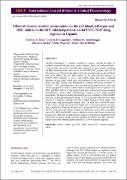Effect of chronic alcohol consumption on the red blood cell count and RBC indices in the HIV infected patients on d4T/3TC/NVP drug regimen in Uganda
Date
2013Author
Bbosa, Godfrey S
Kyegombe, David B
Anokbonggo, William W
Lubega, Aloysius
Mugisha, Apollo.
Ogwal-Okeng, Jasper
Metadata
Show full item recordAbstract
Alcohol consumption is common problem in Uganda. Among the types of alcohols consumed include beers, spirits, liqueurs, wines and traditional brew. These alcohols are easily accessible and consumed by many people including the HIV infected patients who are on the d4T/3TC/NVP regimen. The aim of this study was to determine the effect of chronic alcohol intake on the red blood cell count (RBC) and the RBC indices in the HIV-infected patients on d4T/3TC/NVP regimen. It was a case control study that used a repeated measures design model where serial measurements of the red blood cell count (RBC) and RBC indices were determined at 3 month interval for 9 months. A total of 41 HIV infected patients were recruited and grouped into two arms; the control group had 21 patients and the chronic alcohol group had 20 patients. The RBC and RBC indices of the whole blood were determined using automated hematological Coulter CBC-5 Hematology Analyzer system using standard procedures. The data was sorted into alcohol-use self reporting by WHO AUDIT tool and alcohol-use biomarkers groups. It was analysed using the SAS 2003 version 9.1 statistical package with the repeated measures fixed model. The means were compared using the student t-test. The mean MCV and MCH values in the chronic alcohol use group were higher than in the control group and there was a significant difference between the 2 groups (p<0.05) for both the WHO AUDIT tool group and chronic alcohol use biomarkers group. The mean RBC count, Hct, HGB and MCHC values in both the control and chronic alcohol use groups were within the normal reference ranges for both groups though the trend was lower in alcohol group. Chronic alcohol use affects the RBC and RBC indices in the HIV infected patients on d4T/3TC/NVP treatment regimen.
Collections
- Research Articles [41]

